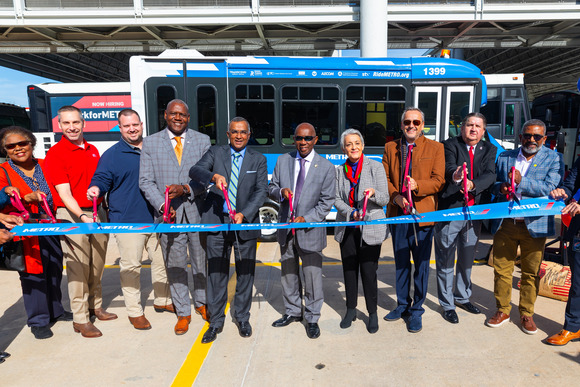
Metro unveiled the newest developments in its mission to increase the sustainability and resilience of Houston's public transit system: its first totally electric bus and a new, self-driving shuttle, known as "FutureLink."
Metro first launched a pilot program for autonomous vehicles in June 2019, with Texas Southern University's self-driven EasyMile vehicle, which runs along the university's one-mile Tiger Walk. The zero-emissions, wheelchair-accessible FutureLink shuttle is intended to connect residents in areas with limited access to public transportation with the city's existing infrastructure.
"This promises to revolutionize access to public transportation, offering a convenient and efficient travel experience for all — especially those residing in our underserved communities," said Metro Chairman Sanjay Ramabhadran.
Organizers also hope the connectors can help accommodate increased needs as the city continues to grow outward. The Houston region is projected to reach a population of 10 million by 2040.
The organization began exploring electric options back in 2017, when it pilot-tested an electric bus. At the time, though, battery technology was not equipped to handle the city's long routes and high temperatures.
"At that time, the bus could get us from one end of the route to the other, but in July and August, the battery could either keep the bus cool or get to the end of the route. Not both," said Ramabhadran. "Now, we have battery technology that can give us cooling technology and the range that we need."
Though Metro currently only has one totally electric bus, it plans to expand its fleet and only procure zero-emissions vehicles by 2030, as part of its Climate Action Plan, adopted in 2020.
"This investment signifies a commitment to a greener future," said Ramabhadran.
Mayor Sylvester Turner said he hopes the move will decrease the impact of climate change in the region long-term, both by decreasing bus emissions themselves as well as decreasing the need for cars.
Currently, the transportation sector accounts for 47 percent of the Houston region's total greenhouse gas emissions, the bulk of which is created by personal vehicles. Nationwide, the transportation sector accounts for 29 percent of total greenhouse emissions, according to the U.S. Environmental Protection Agency. Houston ranked fifth in the world for total amount of carbon dioxide produced by transportation in 2021, according to Climate Trace, an online database that monitors worldwide greenhouse gas emissions.
"What got us to where we are today, where the focus is on resilience, sustainability and electrifying our fleet, is that, in the past eight years, we've faced seven nationally recognized disasters," Turner said. "Providing modes of transportation that reduce greenhouse gas emissions while meeting the needs of folks within our city – this is an ongoing effort."
The FutureLink shuttle will take to the roads in Jan. 2024.

 74 °F
74 °F